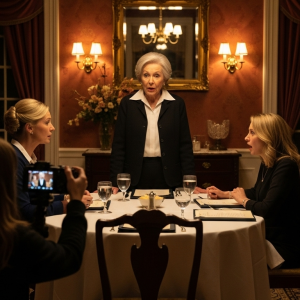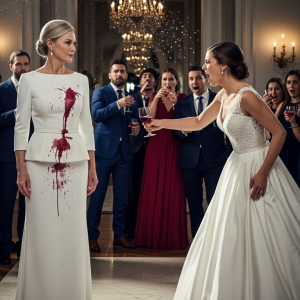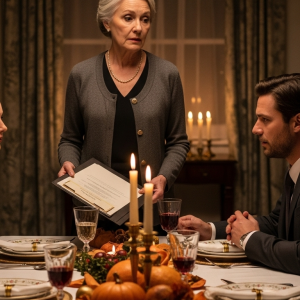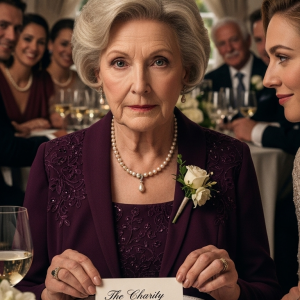What would you do if the moment you waited for your entire life—your only child’s wedding—turned into your greatest humiliation? When everything you gave, all the love and years of devotion, got tossed aside with a single, cruel sentence: Stay in your lane. This is the story of how I did exactly that. And in doing so, I took back everything I had so freely given.
I still remember the moment my son, Andrew, told me he was getting married. It was a quiet Sunday in April, the spring light pouring through my kitchen windows. He sat at the table, twiddling his phone, and finally said it. “Mom, I proposed. Taylor said yes.”
For a second, the world slowed. My baby boy was getting married. After years of being just Mom, and then years of being just Margaret the widow, I was about to become something more again. I smiled so hard my face hurt.
“That’s wonderful, Andrew! Oh, honey, I’m so happy for you both.”
My mind instantly flooded with flowers, fabrics, and floor plans. For thirty-five years, I was one of Boston’s most sought-after wedding planners. This wouldn’t be a job; it would be a joy. A masterpiece. Our wedding.
“I already have some ideas,” I said, laughing with excitement. “Not to interfere, of course. But I’d love to help with the planning. I still have all my contacts.”
That’s when I saw it: a flicker of hesitation in his eyes. He looked away. “Actually,” he said slowly, “Taylor kind of already has a vision. She follows this planner on social media… She’s thinking of reaching out to her.”
I blinked. “Oh. But I thought, as a family event, I could be part of some decisions.”
Then came the sentence that would become the anthem of my exclusion. “Mom… please don’t take this the wrong way, but Taylor said it’d be best if you just… stayed in your lane.”
I held a smile that felt brittle enough to shatter. “Stayed in my lane?” I repeated, hoping he’d laugh it off as a joke. He just nodded. “She thinks it’ll be smoother that way. To avoid confusion.”
My joy curdled into something cold and heavy. That night, I didn’t cry. I lay in the dark, memorizing the unique sting of being rejected by your own child. I told myself it was a misunderstanding. But deep down, I knew this was only the beginning of how invisible I was about to become.
The weeks that followed were a masterclass in polite exclusion. Andrew’s calls were short, obligatory. Taylor never called. I was being pushed to the margins of their life, and the excuse was always the same: they were busy, overwhelmed, and “modern.”
The real humiliation came a few weeks later. Taylor invited me to a “family get-together” at her parents’ house. I wasn’t sure if it was an olive branch or a performance, but I went. Their home was beautiful and cold, a minimalist landscape of grey tones and empty walls, staged for a magazine, not for a life.
Taylor’s mother, Diane, greeted me with a rehearsed charm. “Margaret,” she said, a wine glass already in hand. “Taylor tells us you used to do wedding planning. That must have been… interesting.” Interesting, as if I’d run a knitting club.
The dinner conversation was a whirlwind of things I once lived and breathed—color palettes, vegan catering, guest lists—but I was treated like a curious outsider. Taylor described a lighting feature she’d seen online. “It’s like a tunnel of LED vines that pulses with the music. Totally immersive.”
I offered a gentle caution. “That sounds striking, just be mindful with lighting that intense. It can sometimes overwhelm older guests.”
Taylor’s smile tightened instantly. “I know, Margaret. That’s why I’m working with someone young, someone current.”
The implication landed like a slap: I was old and irrelevant. To fill the awkward silence, I pulled out a small envelope of Andrew’s baby photos. His first Halloween, his toothless grin. “I thought a few of these might be nice for the slideshow.”
Taylor glanced at them. “Oh. They’re cute, but we kind of want the vibe to be more… stylized. These are very… real.” Real, as if it were a flaw. As if her future husband’s messy, joyful childhood wasn’t curated enough for her aesthetic.
I put the photos away. Later, as I was leaving, Andrew walked me to the door. “I’m sorry if tonight felt awkward,” he whispered.
I looked at him, really looked at the exhaustion on his face. “Andrew, do you even see what’s happening?”
“She’s just under pressure,” he mumbled. “Everyone’s got expectations. I just want things to go smoothly.”
“At what cost?” I asked softly. “What part of your life are you sacrificing to keep things smooth?” He didn’t have an answer. I kissed his cheek and walked away, realizing I wasn’t invisible because I had nothing to offer. I was invisible because I reminded them of things you can’t filter into a hashtag: depth, history, and a love that was unapologetically real.
That night, they invited me for a pot roast dinner—his favorite. It was my last attempt. I asked about her dress, and she gave short, evasive answers. When I mentioned a wonderful local seamstress, Taylor finally snapped.

“Margaret, I know you mean well, but you’re not hearing us,” she said, her voice sharp. “We’re doing things differently. It’s not the ‘90s. I already have a planner, and I just need everyone to stay in their lane so it all goes smoothly.”
There it was again. A command. An order. I cleared the dishes, kissed Andrew goodbye, and stood in the silent house. That was the moment I finally accepted it. Fine, I thought. You want me in my lane? I’ll stay there. But the road I’m taking doesn’t lead back to you.
The wedding fund my husband and I had built for twenty years wasn’t just money. It was love in numbers, sacrifice in digits. Someday, he’d said, we’ll give Andrew the wedding we never had. I had held on to that promise through years of loneliness. But I wasn’t going to fund my own erasure.
At the bank, I moved the bulk of the funds to a private account under my name only. I left a symbolic amount behind—enough to maintain the illusion, but not enough to build a fantasy. Then I mailed them a check for that smaller sum.
Dear Andrew and Taylor, the note read. As you prepare for your big day, I wanted to offer a small contribution. Wishing you both joy. With love, Mom.
A week later, Andrew was at my door, his face a storm of confusion and guilt. “Taylor saw the check,” he said, wasting no time. “She was surprised. We both thought… you were planning to cover more.”
“I know,” I said calmly. “But I changed my mind. I was asked to stay in my lane, Andrew, so I did. I was not invited to be part of the vision, so I will not be funding it.”
His jaw tightened. “It’s not like that. Taylor just wants control.”
“Control isn’t an excuse for disrespect,” I replied. “And you stood there and watched me be dismissed. You watched me be erased. You let it happen.” I saw the pain in his eyes, but for the first time, I didn’t try to soothe it.
He sighed, the fight draining out of him. “So that’s it? You’re not going to help at all?”
“I did help,” I said. “In the way I was invited to.” He left soon after, and I knew a storm was coming. But for once, it wasn’t mine to manage.
He called me back a day later, his voice frantic. Taylor had felt betrayed, he said. She had already made commitments. She had signed a contract.
“With whom?” I asked, a cold dread creeping up my spine.
“A planner. Savannah Bloom. She’s huge on social media, two million followers. Taylor had to move fast to book her.”
“Andrew, how much did you give this woman?” He hesitated. “How much?”
“Fifty-five thousand dollars.”
I gripped the edge of the kitchen counter. He admitted they’d never met her in person, that Taylor had “handled” the vetting. I saw the whole disaster playing out in slow motion: the blind trust in a filtered fantasy, the rushed decisions driven by ego, the desperate need for a wedding that looked perfect online.
“Taylor’s blaming me,” he whispered a few weeks later, his voice hollow over the phone. “She said this wouldn’t have happened if we had just used your money.” The irony was a bitter pill. But the truth was, this happened because they believed my love and my life’s savings were guaranteed, an asset they were entitled to.
The news broke a month later. Savannah Bloom, the influencer planner, was a fraud. She had vanished with hundreds of thousands of dollars from couples across the country. Andrew and Taylor were mentioned in a brief line as “local victims.” Victims of a scammer, yes, but also victims of their own hubris.
The engagement, already fragile, collapsed under the weight of financial ruin and bitter blame. Taylor moved back in with her mother. Andrew stayed in the apartment alone, surrounded by the wreckage of a spectacle that never was. He didn’t call, and I didn’t reach out. You can’t teach people to value you. They have to choose to.
So, I stayed in my lane. And in the quiet space they had forced upon me, I began to find myself again. I started a small, free workshop at the community center, helping young couples plan beautiful weddings on tight budgets. They listened. They took notes. They valued my experience. And for the first time in a long time, I felt heard.
I began to heal in the silence, not with drama or announcements, but with quiet, deliberate self-respect. I was no longer the planner-mom, the hostess, or the helper. I was just Margaret. And that, I was learning, was more than enough.
Months later, he was standing by my front gate. He was thinner, the easy confidence gone from his shoulders, replaced by something real. “Hi, Mom.” My heart stuttered.
“You hungry?” I asked. He nodded, a small, grateful smile on his face. “Starving.”
We didn’t talk about Taylor. We talked about his job, a book he was reading, the small things that make up a life. Then, as I cleared the plates, he finally said it.
“Her name’s Emily.” I turned. “She’s different,” he said quietly. “She’s kind. She listens. She asked about you… said she wanted to meet the woman who raised me.” He paused, meeting my eyes directly. “She’s not trying to prove anything. She just wants to build something good.”
My cautious heart stirred. Then he reached into his pocket and pulled out a photo of a woman with a warm, genuine smile, holding a bouquet of wildflowers.
“She said if we ever get married, she’d want you to plan it,” he said, his voice thick with emotion. “She said it would be an honor.”
An honor. I looked at the photo, at the woman who saw me without ever having met me. And for the first time, I was being invited in, not assumed, not taken for granted, but chosen.
“I’d like that,” I said.
The day of Andrew and Emily’s wedding was perfect, a crisp autumn afternoon that felt like a second chance. The ceremony was in a small garden, intimate and real, surrounded only by people who truly loved them. There were no LED vine tunnels, no trendy aesthetics, just two people making a promise grounded in honesty, not perfection.
Andrew stood at the front, his hands trembling slightly. He looked over at me and smiled—a quiet acknowledgment of the long, painful road we had both traveled to get here. When Emily walked down the aisle, she was radiant in her simplicity.
Later, as the evening wound down, they came to me. Andrew wrapped his arms around me, holding on tight. “Thank you, Mom,” he whispered. “This… this was everything.”
Emily, her eyes shining, placed a hand on my shoulder. “You were the heart of this, Margaret. We couldn’t have imagined this day without you.”
I didn’t need any more words. I had stayed in my lane, yes. But in doing so, I had forced them to find their own. And in the end, it was the lane I chose for myself that finally led me back to where I belonged—not as a planner, not as an obligation, but as a cherished part of a family that had learned the difference between a pretty picture and a real, lasting love. And that was more than enough.




